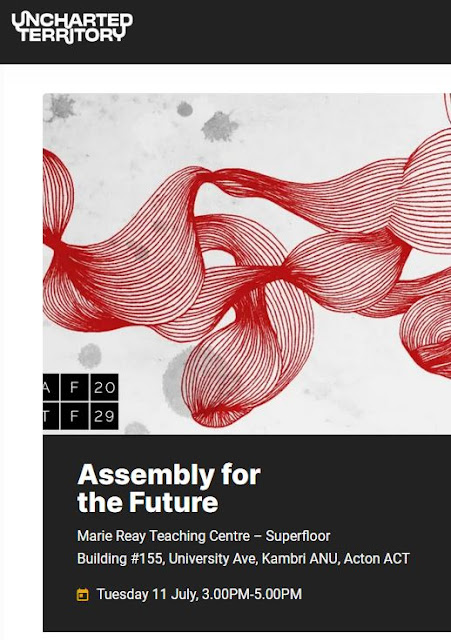Assembly for the Future by The Things We Did, produced by Not Yet It’s Difficult. An Uncharted Territory Event: Canberra producer Kiri Morcombe. At Marie Reay Teaching Centre, Australian National University, July 11, 2023.
Reviewed by Frank McKone
“Assembly for the Future is a series of participatory gatherings in which the public create new visions for futures that may be realistic, idealistic or utterly fanciful.”
www.thethingswedidnext.org/assembly-for-the-future
Those who attended the sixth Assembly for the Future were surely not aware of the next event of this kind which will be at the Canberra Theatre Centre, August 8: An Evening with the Late John Cleese. Cleese will report “on his experiences in the afterlife, and what the audience can expect when they get there (announced in Private Capital, Canberra Times July 12, 2023: Ron Cerabona)
What we participated in was a rather less fanciful consideration of what our future might be like 6 years ahead, in 2029. The Things We Did is co-created by Alex Kelly & David Pledger and produced by Not Yet It’s Difficult, and Assemblies began in 2020 with
Beyond Whiteness – the Rise of New Power
The Last Disabled Oracle
Somewhere, Everywhere, Right Here
followed in 2022 with
Live from Planet City 2029
Live from Blakfullas University 2029
For Uncharted Territory, the standard – even, can I say, old-fashioned – conference format was set up: Keynote Speaker; two 7 minute speakers in reply; then break-up into tables of about 6 for discussion, with each Table Moderator reporting with table-sized butcher’s paper to the whole group at the end.
There was no attempt to finalise a consensus view of the gathering, leaving ideas to float in the expectation that innovators and creators from the sciences and the arts would produce new works in response.
In a sense then, like the John Cleese show, we were participating in a fiction beginning with “a provocation from 2029, [by] First Speaker Bhiamie Williamson - a Euahlayi man from north-west New South Wales with family ties to north-west Queensland – [who mapped] how we have faced the threats of climate change through Indigenous land justice and embedding Caring-for-Country within the national psyche while drawing from Indigenous masculinities to reshape social attitudes more broadly.”
In an unpleasant challenge, I guess, for this kind of Canberra audience, Bhiamie in 2029 presented himself as the first member of the newly formed First Nations Party, following the unsuccessful referendum of October 2023, to be elected to the Senate. His provocative offering was (will be?) his maiden speech in Parliament.
Though the first other speaker, interdisciplinary artist and researcher, Erica Seccombe took a highly positive view of his 'success', creative technologist, Keir Winesmith took a critical position, pointing out that rather than Bhiamie’s election being the result of a new development in Indigenous Intelligence, it was in fact the First Nations Party’s use of Artificial Intelligence in the election process that had won the day for them.
Table Moderators were
Roboticist Damith Herath
Musician & Environmentalist Tim Hollo
Dancer-Performance Maker Alison Plevey
Multidisciplinary artist Anna Raupach
Activist & Researcher Felicity Ruby
Artist-Curator Nina Sellars
Writer & Tsunami scientist Kaya Wilson
Barkindji artist and poet Barrina South
Since, on my table, the moderator was the Roboticist, it was perhaps not surprising that the possibility was raised that AI could be instructed to run the world for us and then could perhaps decide – since AI has no emotional intelligence – on rational grounds to remove the totally destructive free-market oriented humans entirely in order to save the Earth.
On the other hand, others on my table and on most other tables, remained hopeful that through managing capitalism, including by instituting a simple feature such as positively underpinning of society by Universal Basic Income – without the negativity of the concept of ‘welfare’ – and limiting house ownership to only one per person, that in the face of the threat of runaway global warming, collaboration and cooperation will win the day – though hardly in just six years, by 2029, to be honest.
Maybe, John Cleese will find such a fantasy world in his afterlife. I’m planning to find out in August – or more seriously in October.
https://unchartedterritory.com.au/program

